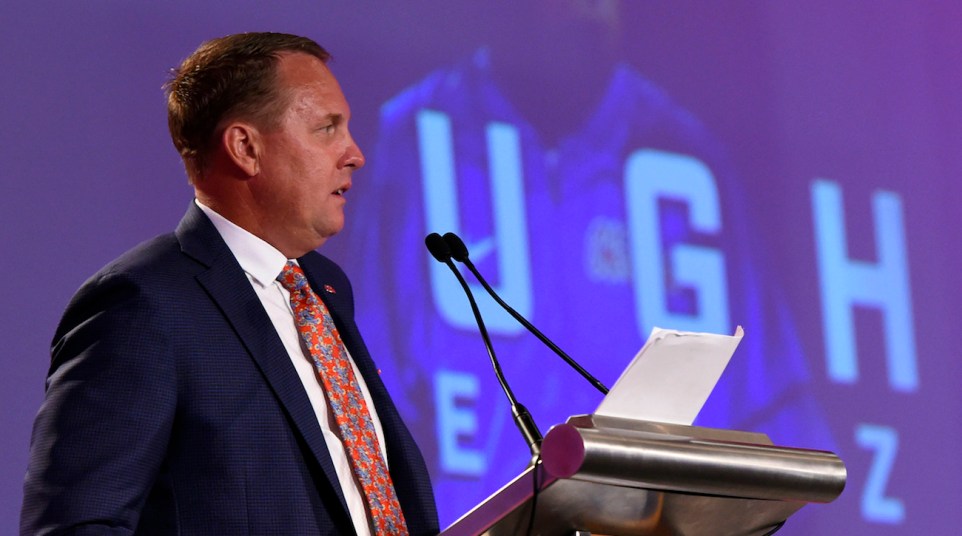
What happened to SEC teams the year after a surprising coaching departure?
We’re all still processing the Hugh Freeze scandal and resignation. But while there are plenty of takes on what Freezegate does or doesn’t mean, one thing there hasn’t been is much examination of it from a football standpoint.
So let’s consider similar recent history.
Our own recent column on the most shocking SEC coaching changes gives us a place to start — let’s look at home those teams handled the sudden, unexpected loss of their head coach. If history tells us anything, it’s that some clues as to the Rebels’ future are probably hidden in how teams from the past coped with a sudden coaching change.
1. Spurrier leaving Florida for NFL
Under Spurrier, the 2001 Gators had gone 10-2 and won the Orange Bowl. That was the eighth 10-win season in nine years for UF. Things did not go as well in 2002. Ron Zook led Florida to an 8-5 season (fewest wins since 1989, the year before Spurrier was hired). It took until 2006 and Urban Meyer to get the Gators back to the top.
Year after resignation: -2 wins.
2. Lane Kiffin leaving Tennessee
Kiffin’s one-year era in Knoxville was longer on hype than results — the Vols went 7-6 with him as the head coach. But mediocre as the Kiffin days were, they were better than the salad days that followed under Derek Dooley, who had a 6-7 season the following year. Tennessee football has made strides but arguably still not fully recovered — the Vols still haven’t won 10 games since 2007, when Phil Fulmer was the coach.
Year after: -1 win
3. Urban Meyer leaves Florida I
This was the resignation that didn’t stick. Meyer’s 13-1 Sugar Bowl winning 2009 team nearly delivered his third national title, but chest pain had Meyer taking a leave of absence. The leave didn’t last, but the hangover for his team did, as Florida went from two consecutive 13-win seasons to 8-5.
Year after: -5 wins.
4. Urban Meyer leaves Florida II
Meyer’s 2010 Gators were his most disappointing team, completing an 8-5 season before he resigned. Successor Will Muschamp didn’t fare any better, going 7-6 in 2011, and having a temporary uptick in 2012, before he himself was headed out of town after the 2014 season.
Year after: -1 win.
5. Petrino run off from Arkansas
Petrino led Arkansas to its first pair of consecutive 10+ win seasons since the late 1980s when he had his struggles with fast bikes and infidelity. After his removal? The Razorbacks went 4-8 with one-year interim coach John L. Smith. They haven’t won 10 games since.
Year after: -7 wins.
6. Spurrier leaving South Carolina in midseason
This one certainly didn’t go swimmingly for the Gamecocks. Spurrier led them to three consecutive 11-win seasons from 2011-2013. But when he quit midseason in 2015, the already beleaguered team crashed to a 3-9 finish. Carolina got back to a bowl game with Will Muschamp in 2016, but they still look to be a few years away from returning to the highs Spurrier reached.
Year after: +3 wins.
7. Mike Price’s “tenure” at Alabama
Mike Price never lost a game as Alabama coach. Of course, he never coached one, either. Alabama fired Price for another version of personal misconduct involving a stripper. He was fired in May, just four months after he was hired to replace Dennis Franchione, who had surprisingly bolted to Texas A&M. Alabama then turned to to Mike Shula, who went 4-9 and had just one winning season in four years.
Year after: -6 wins
8. The Les Miles fake dismissal
Sure, Les Miles didn’t actually get fired in late 2015, as it appeared he would. But his non-firing didn’t work out any better for anyone involved. After an excellent bowl win, Miles went into the 2016 season and promptly fell right on the sword with a 2-2 start that got him axed. LSU finished 8-4, but that’s a drop in the bucket on the Bayou.
What it means for Rebels in 2017
Prepare for a long fall, Rebel fans. Except for South Carolina, which still suffered in the immediate aftermath of Spurrier’s resignation, not one of our unexpected coaching changes resulted in any improvement.
None of these teams fared better after the turmoil — at least, not immediately after.
In fact, they either missed bowl games or went from being top-tier programs to playing in a lower-tier bowl. For a Rebels team that has already banned itself from a bowl game before it faces the NCAA, that doesn’t add up to a promising situation.
